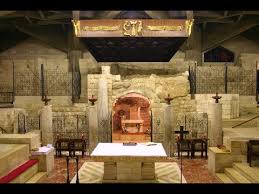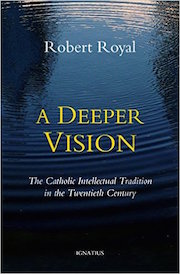In the Catholic media bubble, Bishop Robert Barron is more often defined by what he is not than what he is. He is not a progressive. His embrace of on-and-off conservative figures like Jordan Peterson for his patristic interpretation of Scripture, for instance, rankles devotees of the historical-critical method and the “post-conciliar spirit.” Each time Barron bemoans “wokeness,” he is met with comments from the Left expressing a vague “disappointment.”
Other offenses of Barron’s against progressive Catholicism include but are not limited to:
· his insistence that abortion is the preeminent moral issue of the age,
· his defense of Saint Junipero Serra during the “Great Awokening”,
· and his dismay at the protestantization of liturgy and ecclesial architecture.
On multiple scores, Barron is not a Churchman of the Left.
But Barron is also not a traditionalist. His approval of theologian Hans Urs von Balthasar’s contention that we may hope for Hell to be empty has animated Rad-Trad Twitter for years.
For those committed to small-tent Catholicism, Barron’s emphasis on God’s mercy is a red flag, along with his evangelical efforts through his glossy and sophisticated media outfit, Word on Fire. The release of the popular Word on Fire Bible drew particularly foul sneering for its accompanying commentary, which included the likes of Pope Francis, Thomas Merton, and von Balthasar himself.
Barron also drew Rad-Trad ire by providing what they regarded as insufficiently orthodox responses during web interviews on the Church’s role in salvation and the civil legality of gay marriage with Ben Shapiro and Dave Rubin, respectively.
What’s more, Barron is not part of mainstream American spirituality. Despite his heavy media presence and genial manner, Barron is no Catholic Oprah. He regularly decries what he calls a “beige Catholicism” that caters to popular culture at the expense of spiritual vitality, and which too often slips into moral relativism.
Barron’s preaching portrays a strange and disconcerting Christ, as opposed to the kindly spiritual guru often depicted in mainstream culture. The inaugural episode of Barron’s landmark Catholicism documentary series (“Amazed and Afraid”) is devoted to examining the disorienting nature of Jesus as God Incarnate.
For a mainstream obsessed with inclusivity, Barron’s insistence on the primacy of Christ is anathema. While notable Catholic mainstream figures like Jesuit author and LGBTQ activist Father James Martin devote their lives to making Catholicism palatable to modern culture – and even remaking Catholicism in the modern and postmodern mold – Barron seeks to distinguish Catholicism from modern culture in order to magnify its most controversial claim: that Jesus is Son of the living God. (It should be noted that Barron once wrote a single sentence of tepid praise for one of Father Martin’s least ideological books, on the subject of prayer, which evoked over-the-top hysteria from the traditionalist wing).
It’s possible that Barron’s avoidance of the usual polarized reactions – in particular, about sexual misconduct – factored into Word on Fire’s heavily criticized response to an internal scandal.

The incident prompted the resignation of two senior writers who accused Word on Fire of being more concerned with the public relations element of the controversy than with substance. It appeared to many that Barron’s soft spot for Gloor – whom he personally brought into the faith and mentored – led to his quiet dismissal and the silent removal of all online content related to him.
For critics, Word on Fire’s response lacked urgency and transparency, which was particularly distressing given Barron’s outspokenness regarding the clergy abuse scandal. In the end, Word on Fire commissioned a third-party investigation, which revealed that no illegal activity had taken place. A sub-committee within the organization deemed it appropriate to terminate Gloor’s contract regardless.
The scandal was social-media catnip for Barron’s detractors. A particularly vicious whisper campaign emanated from the traditionalist wing that called into question Barron’s commitment to celibacy, given that two Word on Fire employees, including Gloor, were bodybuilders with shirtless photos of themselves available online.
Progressives came down on Barron as well, accusing him of writing an article soon after on “The Poison of Gossip” as a direct threat to whistleblowers in Catholic organizations.
The Gloor scandal, while serious viewed in isolation, pales in comparison to scandals occurring at major institutions the world over. But voices from across the Catholic media sphere seized on the episode, and Barron absorbed significant blows.
The outsized outcry about the Gloor scandal, along with the steady criticism Barron has garnered for years, raises a crucial and unsettling question: Why are so many Catholics preoccupied with tearing down the American Church’s most effective evangelizer?
Bishop Barron may well have made several missteps. But for a Church that has seen its pews empty rapidly for over a generation, this phenomenon is both bizarre and depressing. It’s as if there is a greater concern for tribal point-scoring than for the larger war over saving the souls of men.
When Barron was appointed Bishop of Winona-Rochester last month, his detractors from within the Catholic bubble took the occasion to go for his throat once again, and also go for the “clicks” that come from generating fresh Barron-related content.
In one particularly odd and telling YouTube, a highly visible Rad-Trad leader interviewed the editor-in-chief of a Catholic magazine to discuss whether or not Barron’s appointment at Winona-Rochester was meant as a promotion or demotion.
The hour-long conversation was laced with a sour mixture of the paranoia, envy, and pathological self-certainty that has come to define a sizable corner of the Catholic web.
Likewise, on the Left, Religion News Service, used the occasion of Barron’s appointment to remind its similarly sizable readership of the Gloor scandal, as well as to raise the spurious contention that a “celebrity” bishop such as Barron could not adequately carry out his episcopal duties.
Barron’s audience and influence in the American Church continue to grow despite the obsessive negativity of his critics and because of all the ways Barron is not like them.
But more important than a sizable audience, Barron boasts the one metric that ultimately matters: his growing contingent of souls – especially young people – formed for Christ and His Church.
It would be wise and good and only fair for critics of Barron to first cast their own nets as effectively for souls before casting stones.
You may also enjoy:
Brad Miner’s Euanggelion: The Triumph of Fr. Barron’s “Catholicism”
James Matthew Wilson’s The Body of Notting Hill
Saturday’s column “Understanding Bishop Robert Barron” contained an inaccurate statement that the bishop’s organization, Word on Fire, “was rocked by revelations that one of its rising stars, former fitness figure and MTV personality Joey Gloor, behaved in sexually inappropriate ways with several coworkers.” In fact, Gloor behaved in sexually inappropriate ways outside of work, in his personal life. We regret giving any impression that the problem inside Word on Fire went beyond the one individual and have corrected the column where the mistake first appeared.















